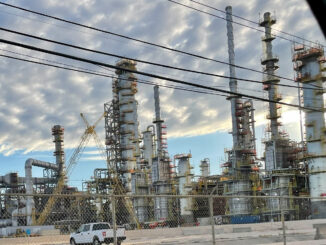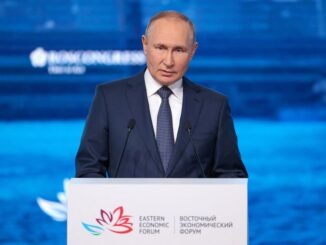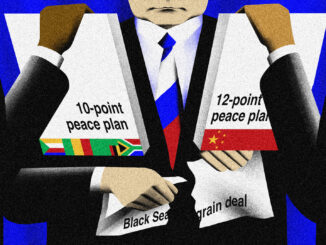
In a significant development amid escalating U.S. sanctions on Russian energy firms, Lukoil PJSC’s roster of potential buyers for its international assets has grown to include major players like Exxon Mobil Corp., Chevron Corp., and Abu Dhabi National Oil Co. (ADNOC), alongside U.S. private equity firm Carlyle Group.
This expansion comes as Lukoil races to offload its overseas holdings before stringent U.S. sanctions take full effect on December 13, 2025, potentially freezing transactions and complicating operations.
What Does This Mean?
At its core, this signals Lukoil’s urgent push to divest non-Russian assets in response to U.S. Treasury sanctions imposed under the Trump administration, aimed at curtailing Moscow’s revenue streams funding its military actions in Ukraine.
The sanctions, which target Russia’s second-largest oil producer, have accelerated a fire sale of Lukoil’s global portfolio, including stakes in oil fields, refineries, and gas projects across countries like Iraq, Uzbekistan, and Bulgaria.
For Lukoil, this means severing ties with valuable international operations to mitigate financial fallout, while for suitors, it presents opportunities to acquire premium energy assets at potentially discounted prices amid geopolitical turmoil.
The broader implication is a reshaping of global energy dynamics. Western majors like Exxon and Chevron, which exited Russia post-2022 invasion, are now circling back indirectly through these assets, potentially bolstering their portfolios in stable regions like the Middle East and Central Asia.
ADNOC’s involvement underscores the Gulf’s growing appetite for diversified oil investments, while Carlyle’s interest highlights private equity’s role in bridging complex deals.
Is This a Negotiation Tactic to Bring President Putin to the Table?
There’s a strong case to view this as part of a broader U.S. strategy to pressure Russia economically and diplomatically. The Trump administration has explicitly linked sanctions relief to ending the Ukraine conflict, with Treasury statements emphasizing that “President Trump has been clear that the war must end immediately.”
By sanctioning key revenue generators like Lukoil and Rosneft, Washington aims to disrupt Russia’s war funding, forcing concessions at the negotiating table.
The blocking of Lukoil’s initial deal with Gunvor Group—a Swiss trader co-founded by a Putin ally and labeled a “Kremlin puppet” by the U.S.—exemplifies this tactic.
Gunvor withdrew after Treasury threats, with the U.S. insisting any sale must “completely sever” Russian control.
This not only thwarts Moscow’s evasion attempts but also signals to Putin that prolonged conflict will erode Russia’s global energy influence, potentially making negotiations more appealing to preserve economic stability.
However, Putin’s response has been defiant, downplaying the sanctions’ impact and warning of global oil price spikes.
The Kremlin has urged respect for the “legitimate interests” of sanctioned firms, framing the moves as unfair interference rather than yielding ground.
Details of the Expanded Suitor List
Lukoil’s international assets, valued potentially in the billions, include a 45% stake in Iraq’s West Qurna 2 oil field (where Exxon and Chevron have shown specific interest), gas fields in Uzbekistan, and refineries in Bulgaria and Italy.
The company prefers a single-package sale to one buyer before the December deadline, possibly leading to a two-stage process where a firm like Carlyle acquires everything and then parcels it out.
Exxon Mobil: Eyeing overlaps like West Qurna 2, aligning with its strategy to expand in low-cost, high-yield regions.
Chevron: Focusing on selective assets rather than the full portfolio, building on its global upstream presence.
ADNOC: Interested in broadening its international footprint, potentially through gas and oil stakes in Central Asia.
Carlyle Group: As a private equity player, it could act as an intermediary, buying in bulk and reselling, similar to its exploration of options last week.
This list emerged after the U.S. Treasury issued a short-term license on November 14, 2025, allowing talks until December 13, extended from an earlier waiver.
White House Statement and U.S. Position
The White House, via the Treasury, has been vocal: sanctions waivers are temporary and conditional on deals that fully detach assets from Russian influence.
In blocking the Gunvor bid, a Treasury statement directly tied it to the Ukraine war, stating, “As long as Putin continues the senseless killings, the Kremlin’s puppet, Gunvor, will never get a license to operate and profit.”
This underscores Washington’s use of economic leverage to push for peace, with potential for further extensions if progress is made.
Feedback from Russia and President Putin
Moscow’s reaction has been one of resilience and criticism. Putin has stated that while sanctions on Lukoil and Rosneft are “serious,” they won’t “significantly impact our economic well-being” but could drive up global energy prices.
He remains defiant, accusing the U.S. of exacerbating energy market volatility.
The Kremlin has called for respecting the “legitimate interests” of Russian firms, viewing the suitor scramble as an overreach that ignores fair business practices.
Lukoil itself confirmed talks with buyers but emphasized compliance with sanctions.
Could This Help End the War in Ukraine?
Potentially, yes—if the sanctions bite deep enough to strain Russia’s war machine. By targeting oil revenues, which fund a significant portion of Moscow’s military budget, the U.S. aims to create internal pressure on Putin to negotiate.
The explicit linkage in U.S. statements suggests this is designed to incentivize de-escalation. However, Putin’s track record of endurance amid sanctions indicates it might prolong the stalemate rather than force an immediate end, unless combined with battlefield shifts or diplomatic breakthroughs.
What Should Investors Look For?
Investors in energy stocks should monitor:U.S. Treasury Decisions: Approvals or extensions of waivers could greenlight deals, boosting shares of Exxon (XOM) and Chevron (CVX) through asset acquisitions.
@financialjuice
Geopolitical Escalations: Any Russian retaliation or war developments could spike oil prices, benefiting majors but adding volatility.
Deal Structures: Watch for package vs. piecemeal sales; a Carlyle-led buyout could create secondary opportunities.
Market Impacts: Sanctions might tighten global supply, supporting higher Brent crude prices—track WTI/Brent spreads and inventory data.
Stock Movements: XOM and CVX could see gains on acquisition news, while Russian-exposed firms face downside risks.
This unfolding saga highlights the intersection of energy markets and geopolitics, with high stakes for global stability and investment returns.
Stay tuned to Energy News Beat for updates.









Be the first to comment